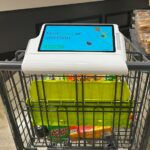The whole idea of personalized coupons is to offer you discounts that are likely to appeal to you. And the better the retailer knows you, the more relevant the coupon offers can be.
So, taken to its logical conclusion, the most appealing coupon offers could come if the retailer knows you really, really well – maybe a little too well.
Continuing its recent run of coupon-related patent applications, IBM is proposing a system that will analyze you as you walk into a store, immediately assess what you’re likely to buy, and offer you personalized discounts accordingly.
The patent application is entitled “Increasing Sales Efficiency by Identifying Customers Who Are Most Likely to Make a Purchase”. And it proposes using facial recognition cameras, a key fob, your cell phone or other sensors to identify you as you enter a store, then delivering a personalized promotion to your phone that the store hopes you won’t be able to resist.
“Retail establishments often struggle to identify the desires and habits of their customers based on their individual purchases,” the patent application reads. “As technology continues to advance, additional data can be gathered in real time about a customer as they enter a retail store.”
So IBM’s system would identify you, then pull up your purchase history and demographic information. Then “coupons and discounts, some of which are targeted to meet determined priorities of the prospective customers, can be presented to the prospective customers to influence their purchasing decisions,” the patent documentation reads.
The system would also consider external factors like the weather outside or how crowded the store is at the time. A clothing store, for example, might offer you a coupon for cold-weather gear if the weather is chilly. And if the store is particularly busy, you might be informed of promotions in “portions of the retail establishment that are less crowded,” the patent application explains. “Another strategy would be to draw customers to items they may purchase quickly to clear out room for additional customers.”
It sounds fairly benign, if a little manipulative, so far. But then the real “personalization” begins.
First, cameras could see if you’re carrying a shopping bag from another store, such as, say, a shoe store. “Based upon what the customer has already purchased” from the shoe store, the patent documentation reads, the system “can develop a sales strategy to direct the customer towards purchasing accessories”, such as socks or shoe polish. If you enter a pet store with a dog or a cat, you could be offered a deal on products specific to that particular pet. And if you’re accompanied by your kids, that “may indicate the customer is more likely to purchase a toy or clothing for the small children.” So the system “can provide coupons or discounts for certain items that the customer is likely to purchase.”
And what if you enter the store with another person the cameras don’t recognize? That’s when things get even more personal – a little uncomfortably so.
“If a male customer enters a retail establishment with a woman of similar age, the controller can look for photos in the (customer’s) social media data that may tag or otherwise indicate that the woman is the male customer’s wife. Further, the social media data can contain additional information such as the date of birth of the customer and/or the wife of the customer.” If that data indicates the wife’s birthday is coming up, the system can “highlight birthday gifts for the wife of the customer and direct the customer to potential purchases.”
The patent documentation also mentions taking into account “certain indications of a customer’s state of being, either financially or emotionally,” without spelling out exactly how it might learn this information. Could cameras determine that you’re having a bad day and a good coupon offer might perk you up? Or could your customer data reveal details about your bank account, helping to determine how big of a discount you might be offered?
Personalized promotions are nice. But the next time you complain about getting offers that aren’t relevant to you – be careful what you wish for.
















